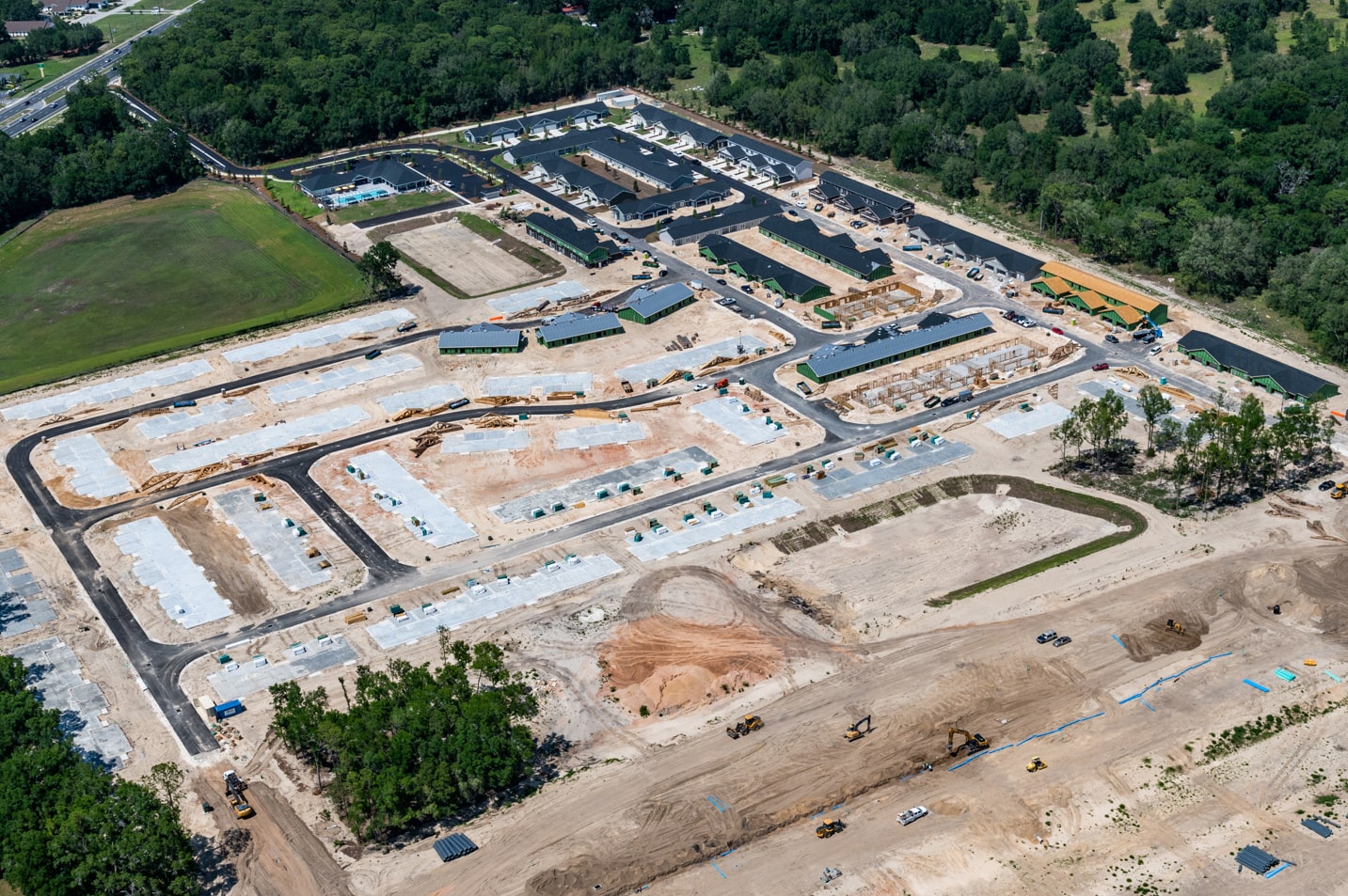From The Desk Of The CEO | June 7, 2023
7 Frequently Asked Questions for Real Estate Developers

Aerial view of our newest development project, West Shire Village in Ocala, FL.
From the Desk of the CEO
Real estate development is a complex and dynamic industry that requires careful planning, market knowledge, and an in depth understanding of legal and financial considerations. Whether you’re an experienced developer or just starting out, it’s essential to have a clear understanding of the key aspects that drive successful real estate projects and be highly engaged in the broader market to help anticipate any fluctuations that might adversely affect project viability. In this blog post, I explore some frequently asked questions that we often encounter as developers.
1. How do I find suitable development opportunities?
Finding suitable, profitable development opportunities requires thorough market research and networking. Some strategies include developing relationships within the brokerage community, attending industry events, leveraging lenders, and building relationships with local government officials and other industry professionals. Check out my recent blog post that discusses Things to Know When Selecting a Site to Develop.
2. What permits and approvals do I need?
The permits and approvals required for a real estate development project vary depending on the location and the type of project. It typically involves zoning permits, environmental clearances, building permits, and other regulatory approvals. Time and again we’ve found that engaging with local government agencies and hiring experienced consultants is crucial in streamlining this process. An ounce of preparation is worth a pound of cure!
3. How do I secure financing for my project?
Securing financing is a critical aspect of real estate development. In my eyes the most critical. Developers can explore various options such as traditional bank loans, private investors, crowdfunding, or partnerships with equity investors. No matter which way you go, it is extremely important to prepare a comprehensive business plan, financial projections, and demonstrate a strong track record of successful development projects to attract potential lenders or investors.
4. What are the risks involved in real estate development?
Real estate development comes with inherent risks, including market fluctuations, construction delays, regulatory changes, and unforeseen expenses. It’s crucial to conduct thorough due diligence, assess market conditions, have contingency plans, and work with experienced professionals such as architects, engineers, and attorneys to mitigate potential risks. Ongoing maintenance and regular upkeep are areas often overlooked by developers and proactive property management after the fact is key for long term success.
5. How do I estimate the project’s profitability?
Estimating profitability requires a detailed financial analysis, including the evaluation of project costs, projected revenues, and market trends. It’s essential to consider factors such as acquisition costs, construction expenses, financing costs, holding costs, and expected sales or rental income. Working with financial advisors or consultants can help ensure accurate and realistic projections. In our case, having an experienced team of financial experts directly in-house is invaluable.
6. How can I navigate the local zoning regulations?
Local zoning regulations dictate land use, density, setbacks, and other development parameters. It’s essential to research and understand the zoning codes and engage with local government officials to ensure compliance. Seeking legal counsel familiar with local zoning regulations can be beneficial in navigating potential challenges. Again, if you have the resources, I highly recommend assembling a strong, competent legal team to assist in this process or outside fees and time can quickly add up which can kill the bottom line of any project.
7. How do I market and sell my development project?
Effective marketing is vital to attract buyers or tenants to a real estate development project. Utilize multiple marketing channels such as online listings, social media, traditional advertising, and partnering with real estate agents. Showcase the unique features and benefits of the project, highlight its location, amenities, and any competitive advantages. Not to sound like a broken record, but we also employ an in-house marketing team which allows us to effectively advertise our development projects from start to finish and top to bottom.
Real estate development offers exciting opportunities for those with the knowledge and expertise to navigate the complex landscape. By understanding and addressing these frequently asked questions, developers can enhance their chances of success and minimize potential pitfalls. Remember, real estate development is a dynamic industry, and staying informed, adaptable, and connected to industry professionals can greatly contribute to a successful project. And don’t forget how valuable it is to have a seasoned team behind you to lend their expertise to each and every aspect of the development process. 

Sincerely,
Ezra Stark
Chief Executive Officer

